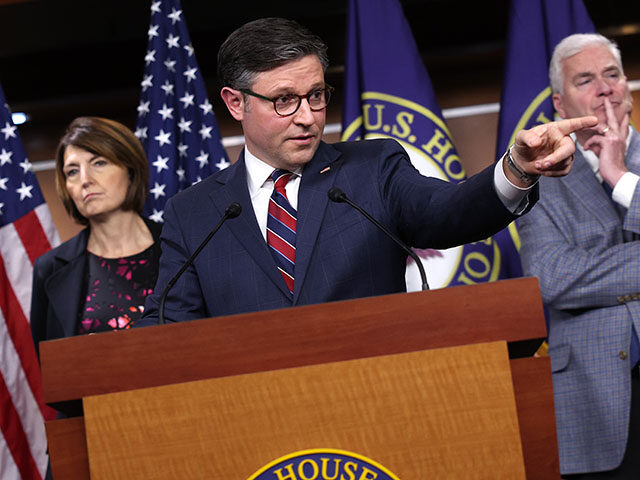Speaker Mike Johnson (R-LA) and congressional leaders have struck a spending framework deal that may avert a government shutdown; however, it may frustrate conservatives who want more drastic cuts.
The bipartisan framework would set defense funding at $866 billion and non-defense spending at $704 billion for the current fiscal year, which is in line with the spending levels set with the Fiscal Responsibility Act (FRA), the debt limit deal struck by President Joe Biden and former Speaker Kevin McCarthy (R-CA).
The deal arose just about two weeks before funding for many government agencies was set to expire. The first tranche of agency funding was set to expire, while the remainder would end on February 2.
In his letter to House lawmakers, Johnson said that the “final spending levels will not satisfy everyone, and they do not cut as much spending as many of us would like.”
The Speaker said that the deal would remove in overall “$30 billion total reduction” from the Senate’s spending plans. He explained that there would be $10 billion in cuts to the IRS mandatory funding, and $6.1 billion from the “Biden administration’s continued COVID-era slush funds.”
“While these final spending levels will not satisfy everyone, and they do not cut as much spending as many of us would like, this deal does provide us a path to: 1) move the process forward; 2) reprioritize funding within the topline towards conservative objectives, instead of last year’s Schumer-Pelosi omnibus; and 3) fight for the important policy riders included in our House FY24 bills,” Johnson continued.
Senate Majority Leader Chuck Schumer (D-NY) and House Minority Leader Hakeem Jeffries (D-NY) said in a joint statement that the framework would continue protecting “key domestic priorities like veterans benefits, health care and nutrition assistance from the draconian cuts sought by right-wing extremists.”
Biden said that the deal would be one step closer to preventing “needless government shutdown and protecting important national priorities.”
“It reflects the funding levels that I negotiated with both parties,” the president added.
Although congressional leaders have praised the deal, the Freedom Caucus believes that the deal would not seriously cut spending.
“It’s even worse than we thought. Don’t believe the spin. Once you break through typical Washington math, the true total programmatic spending level is $1.658 trillion — not $1.59 trillion. This is total failure,” the Freedom Caucus wrote.
It’s even worse than we thought.
Don’t believe the spin. Once you break through typical Washington math, the true total programmatic spending level is $1.658 trillion — not $1.59 trillion.
This is total failure. https://t.co/QBok5lpa6E
— House Freedom Caucus (@freedomcaucus) January 7, 2024
FreedomWorks President Adam Brandon said in a written statement:
Discretionary spending isn’t driving budget deficits and debt. That’s a fact. The Congressional Budget Office projects that discretionary spending as a percentage of GDP will be lower in FY 2024 than it was in FY 1996. Projections are that discretionary spending will continue to tick downward over the next decade. Trust fund programs and interest on the share of the debt held by the public are what’s driving deficits and debt and, ultimately, what’s pushing America into a sovereign debt crisis. We need Congress to begin focusing on solutions to that crisis rather than nibbling around the edges by arguing over discretionary spending, which amounts to a little more than a quarter of federal outlays. Speaker Johnson promised a fiscal commission when he took the gavel in October. We’re still waiting to see movement on that. This is a crisis that needs to be taken seriously, and we hope legislation to establish a fiscal commission becomes a top priority in the coming weeks.
The Freedom Caucus said in its December 29 statement:
Unfortunately, members of the House and Senate have done little to force a course correction from this calamity. Indeed, many have been party to it. Worse yet, we are extremely troubled that House Republican leadership is considering an agreement with Democrats to spend even higher than the modest $1.59 trillion statutory cap set six months ago by the Fiscal Responsibility Act, and to obscure the actual spending numbers with more shady side deals and accounting tricks. This is totally unacceptable.
As Congress negotiates FY 2024 government funding, Republicans must truly reduce programmatic spending year-over-year from the enacted FY 2023 level, and end the use of disingenuous gimmicks to conceal from Americans the real spending harm being perpetrated by their elected representatives. Anything less represents more failure and suffering for the American people.
“Republicans promised millions of voters that we would fight to change the status quo, and it is long past time to deliver,” the Freedom Caucus added.
Sean Moran is a policy reporter for Breitbart News. Follow him on Twitter @SeanMoran3.

COMMENTS
Please let us know if you're having issues with commenting.